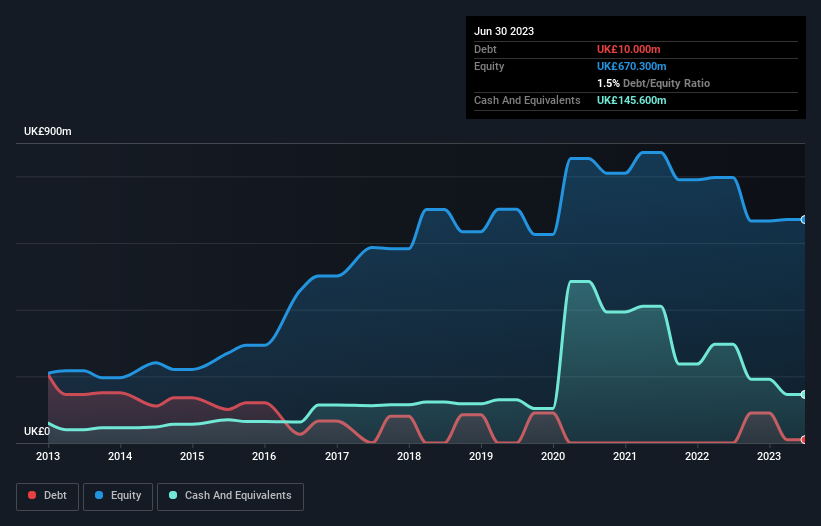Warren Buffett famously said, 'Volatility is far from synonymous with risk.' So it might be obvious that you need to consider debt, when you think about how risky any given stock is, because too much debt can sink a company. We note that Hays plc (LON:HAS) does have debt on its balance sheet. But should shareholders be worried about its use of debt?
When Is Debt A Problem?
Generally speaking, debt only becomes a real problem when a company can't easily pay it off, either by raising capital or with its own cash flow. Part and parcel of capitalism is the process of 'creative destruction' where failed businesses are mercilessly liquidated by their bankers. However, a more usual (but still expensive) situation is where a company must dilute shareholders at a cheap share price simply to get debt under control. Having said that, the most common situation is where a company manages its debt reasonably well - and to its own advantage. The first step when considering a company's debt levels is to consider its cash and debt together.
View our latest analysis for Hays
What Is Hays's Debt?
As you can see below, at the end of June 2023, Hays had UK£10.0m of debt, up from none a year ago. Click the image for more detail. However, it does have UK£145.6m in cash offsetting this, leading to net cash of UK£135.6m.

A Look At Hays' Liabilities
According to the last reported balance sheet, Hays had liabilities of UK£1.06b due within 12 months, and liabilities of UK£174.1m due beyond 12 months. Offsetting these obligations, it had cash of UK£145.6m as well as receivables valued at UK£1.21b due within 12 months. So it actually has UK£122.5m more liquid assets than total liabilities.
This surplus suggests that Hays has a conservative balance sheet, and could probably eliminate its debt without much difficulty. Simply put, the fact that Hays has more cash than debt is arguably a good indication that it can manage its debt safely.
On the other hand, Hays saw its EBIT drop by 7.0% in the last twelve months. If earnings continue to decline at that rate the company may have increasing difficulty managing its debt load. The balance sheet is clearly the area to focus on when you are analysing debt. But ultimately the future profitability of the business will decide if Hays can strengthen its balance sheet over time. So if you're focused on the future you can check out this free report showing analyst profit forecasts.
Finally, a business needs free cash flow to pay off debt; accounting profits just don't cut it. Hays may have net cash on the balance sheet, but it is still interesting to look at how well the business converts its earnings before interest and tax (EBIT) to free cash flow, because that will influence both its need for, and its capacity to manage debt. During the last three years, Hays produced sturdy free cash flow equating to 54% of its EBIT, about what we'd expect. This cold hard cash means it can reduce its debt when it wants to.
Summing Up
While it is always sensible to investigate a company's debt, in this case Hays has UK£135.6m in net cash and a decent-looking balance sheet. So we don't have any problem with Hays's use of debt. The balance sheet is clearly the area to focus on when you are analysing debt. But ultimately, every company can contain risks that exist outside of the balance sheet. For instance, we've identified 1 warning sign for Hays that you should be aware of.
If you're interested in investing in businesses that can grow profits without the burden of debt, then check out this free list of growing businesses that have net cash on the balance sheet.
Valuation is complex, but we're here to simplify it.
Discover if Hays might be undervalued or overvalued with our detailed analysis, featuring fair value estimates, potential risks, dividends, insider trades, and its financial condition.
Access Free AnalysisHave feedback on this article? Concerned about the content? Get in touch with us directly. Alternatively, email editorial-team (at) simplywallst.com.
This article by Simply Wall St is general in nature. We provide commentary based on historical data and analyst forecasts only using an unbiased methodology and our articles are not intended to be financial advice. It does not constitute a recommendation to buy or sell any stock, and does not take account of your objectives, or your financial situation. We aim to bring you long-term focused analysis driven by fundamental data. Note that our analysis may not factor in the latest price-sensitive company announcements or qualitative material. Simply Wall St has no position in any stocks mentioned.
About LSE:HAS
Hays
Engages in the provision of professional and skilled recruitment services in Germany, the United Kingdom, Ireland, Australia, New Zealand, and internationally.
Excellent balance sheet and good value.
Similar Companies
Market Insights
Community Narratives



